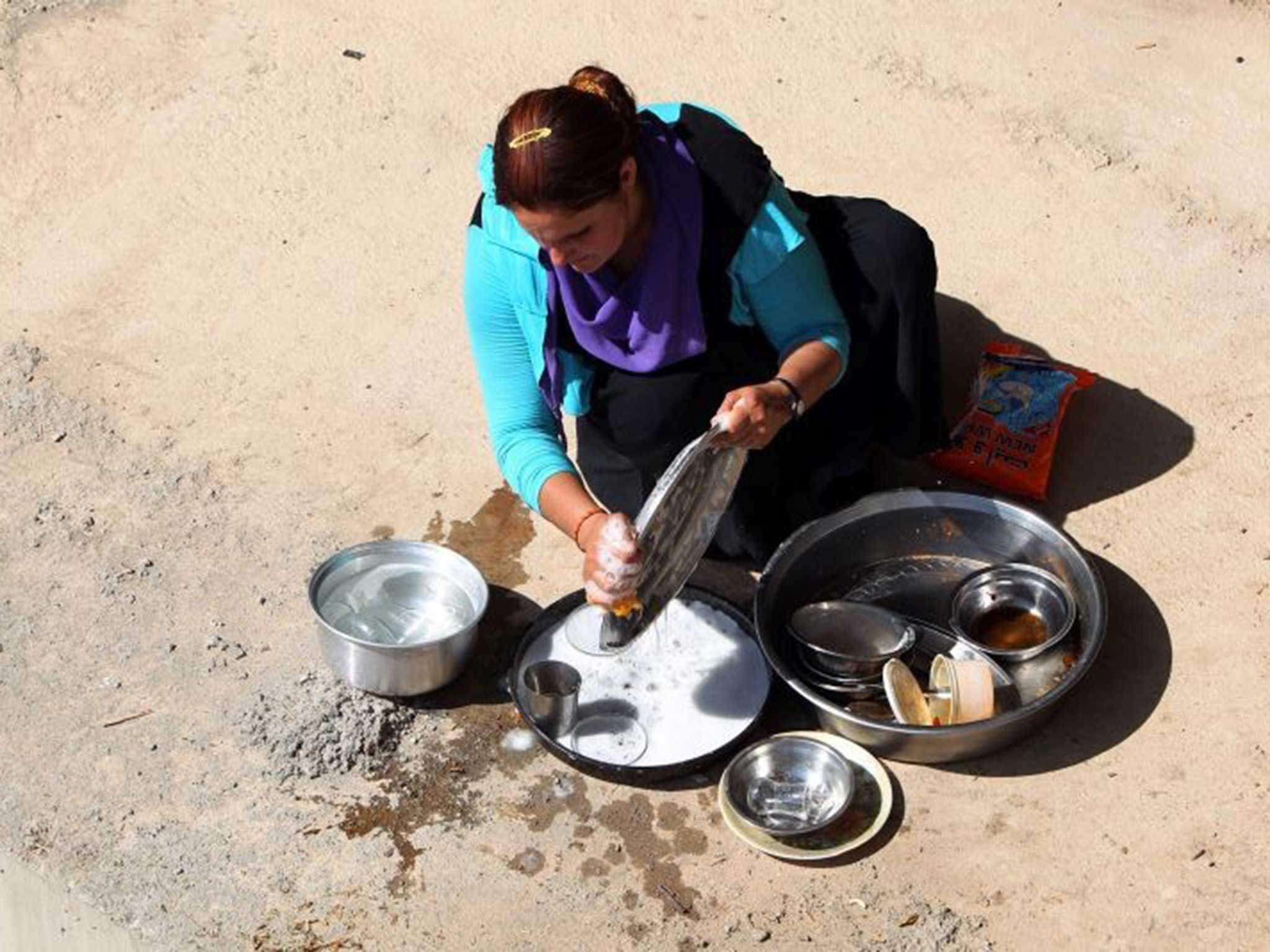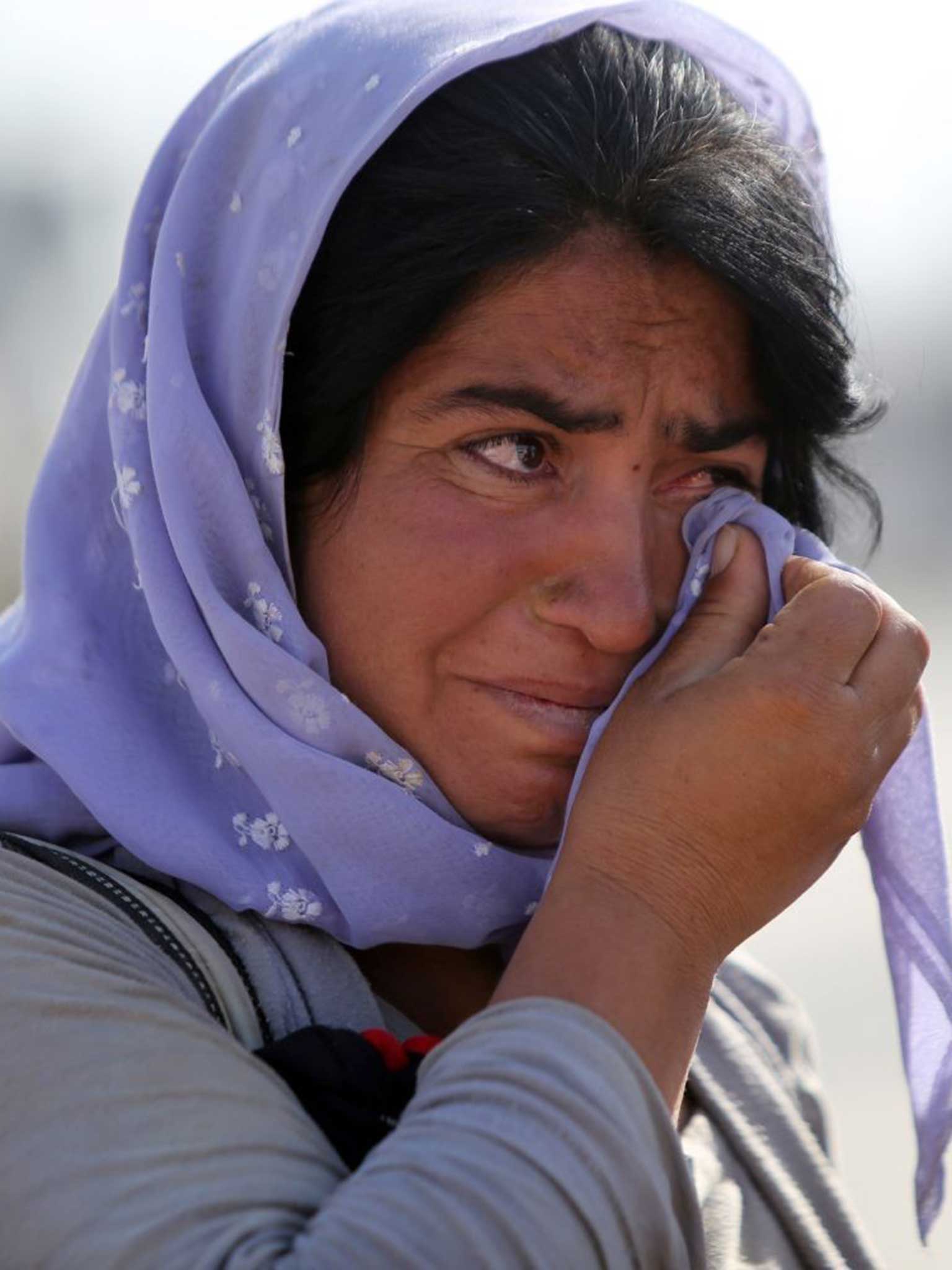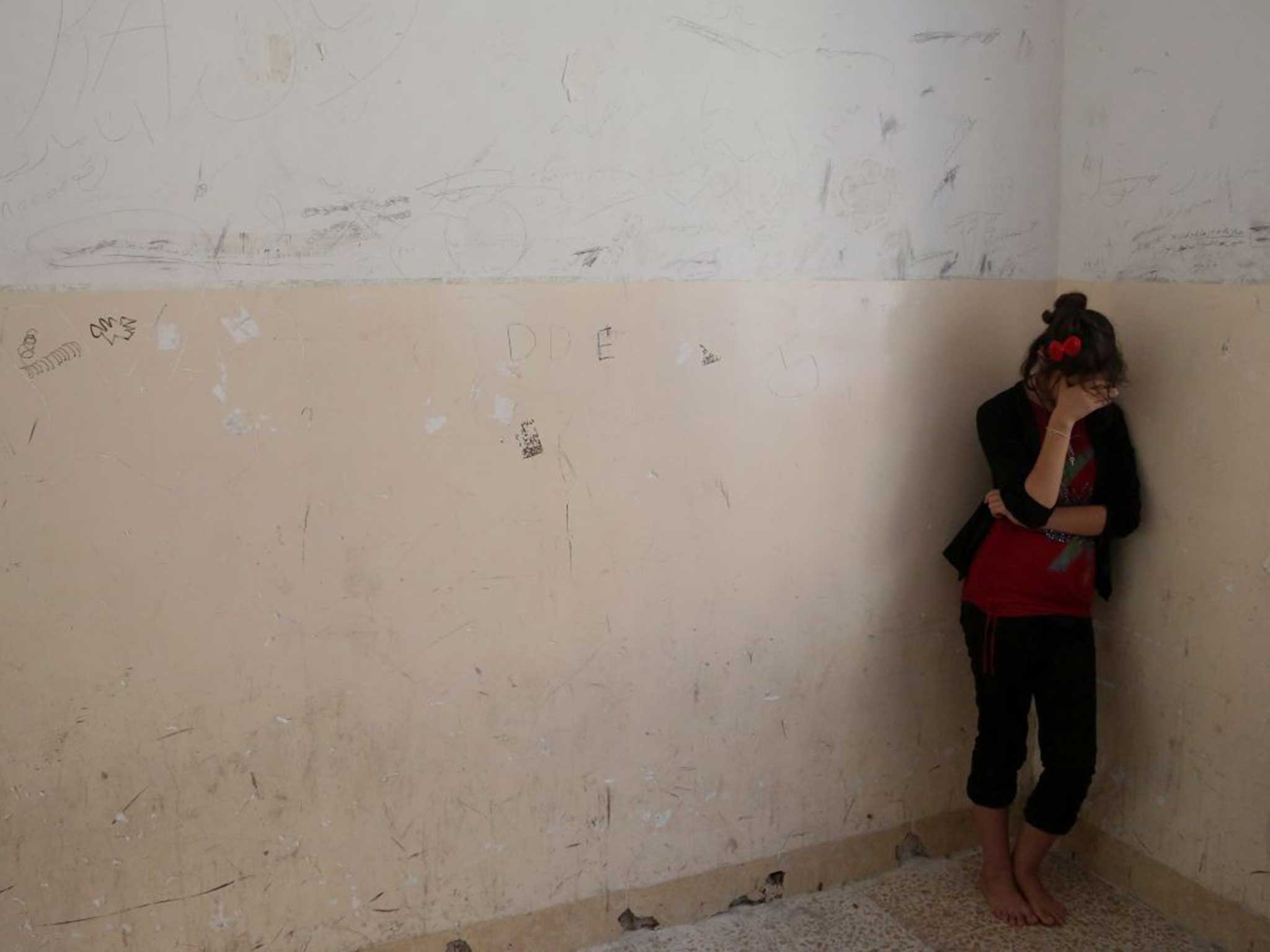Iraq crisis: Isis militants plan to 'marry' captured Yazidi women
Witnesses say more than 1,000 captured women were divided into groups, with younger ones apparently intended as so-called brides if they converted to Islam

Your support helps us to tell the story
From reproductive rights to climate change to Big Tech, The Independent is on the ground when the story is developing. Whether it's investigating the financials of Elon Musk's pro-Trump PAC or producing our latest documentary, 'The A Word', which shines a light on the American women fighting for reproductive rights, we know how important it is to parse out the facts from the messaging.
At such a critical moment in US history, we need reporters on the ground. Your donation allows us to keep sending journalists to speak to both sides of the story.
The Independent is trusted by Americans across the entire political spectrum. And unlike many other quality news outlets, we choose not to lock Americans out of our reporting and analysis with paywalls. We believe quality journalism should be available to everyone, paid for by those who can afford it.
Your support makes all the difference.The fate of more than 1,000 Iraqi women captured by Isis militants remains unclear, as Kurdish troops moved closer to the city of Mosul, which was taken by Isis in June.
Witnesses said that the captured women, who were of the Yazidi faith, were divided into groups of younger and older women.
The witnesses said they were not aware that Isis had maltreated either group but it appeared that the younger women were intended as so-called brides of Isis fighters if they converted to Islam.
Meanwhile, Kurdish peshmerga forces were moving towards targets around Mosul last night and claimed to have taken the strategically important dam on the Euphrates river. It is the largest in Iraq and controls water and electricity supplies to a large part of northern Iraq.
Isis was hit repeatedly by US air strikes, which enabled the Kurds to advance. The US Central Command said a combination of bombers, fighter jets, attack planes and unmanned drones launched 14 strikes near the dam, after nine strikes on Saturday.
Kurdish forces are also believed to have recaptured the mainly Christian towns of Batmaiya and Telasqaf, 18 miles from Mosul., the closest they have come to the city since Isis fighters drove government forces out in June.
David Cameron said yesterday that Britain should consider an alliance with Shia Iran to deal with the Sunni extremists of Isis, saying they were seeking to create a “terrorist state” stretching from Iraq to the Mediterranean that could pose a threat closer to home.
He warned that Isis should not be viewed as “a problem miles away from home”, saying it would “only grow stronger until it can target us on the streets of Britain”.
Women held as chilling saga continues of kidnappings and executions in northern Iraq
By Liz Sly
Hundreds of Yazidi women captured by Islamic extremists during their sweep through the town of Sinjar are being incarcerated at scattered locations across northern Iraq in what increasingly looks like a deliberate attempt to co-opt them into service as the wives of fighters.
As al-Qa’ida-inspired Isis militants surged into the area from surrounding Arab villages two weeks ago, snaring those who had not managed to flee, they showed a marked interest in detaining women, notably the youngest and prettiest, according to witnesses, relatives and, in some instances, the women themselves.
Women were separated from men, then younger women were separated from older ones, with most shunted off in buses or trucks.
Once in custody, the women are presented with a bleak choice. Those who convert to Islam can be promised a good life, with a house of their own and – implicitly – a Muslim husband, because the extreme interpretation of Islam promoted by Isis does not permit women to live alone. Otherwise, they have been told, they can expect a life of indefinite imprisonment – or, they fear, death.
The accounts of the women’s capture and detention have been assembled from multiple interviews with Yazidi refugees, witnesses, activists and women who have been able to reach out to the outside world using mobile phones they were carrying when they were detained. The identities of the women, and some of the specifics of their accounts and communications, are being withheld to protect them from being discovered by their captors.
The accounts point to a chillingly deliberate effort to harness the women into the service of the Isis’s project to create a caliphate across the Muslim world by persuading them to convert and then marrying them to the men of the group. The women “are considered apostate, and it is haram [forbidden] for Muslims to marry a non-Muslim”, said Hoshyar Zebari, a senior Kurdish leader who until recently served as Iraq’s Foreign Minister. He puts the number of women detained at more than 1,000.
“Many fighters came from foreign places without wives, so they want the women to convert so they can become brides of the jihadis,” he said.
The Iraqi government claims that 1,500 women have been detained and 500 men executed in the brutal blitz by the extremists through the Sinjar area, where a majority of the residents are Yazidis, but with some Christians, Shia or Sunni Arabs.
Women from other sects also have been detained but the majority of the captives appear to be Yazidis, whose beliefs are considered heretical by Islamist extremists.
The Sinjar Crisis Group, formed by Yazidi activists in Washington, has compiled a list of 1,074 names of female captives reported by their relatives to be in the custody of Isis.

On Saturday, 100 or so women joined that list, turning up crammed into two buses at a school in the town of Tal Afar, where hundreds of the women are already being held, according to an eyewitness. The new arrivals had been detained the previous day in the small village of Kocho, where Kurdish officials and Yazidis say that more than 80 men were lined up and shot – before the younger women were separated from the older ones and taken away.
The oldest women in Kocho weren’t detained, but are being held there by Isis fighters who also spared the oldest men, Ziad Sinjari, a Kurdish peshmerga commander in Sinjar, said, citing the account of one of six survivors of the massacre.
Once at the school, the eyewitness said, the youngest women again were parted from older ones and driven away, along with a dozen or so boys aged between 10 and 12 who had apparently been detained with their mothers.
The reports from the massacre at Kocho and its aftermath show a disturbing pattern emerging in the two weeks since the majority-Yazidi town of Sinjar was overrun. US air strikes and an airlift of humanitarian supplies helped most of those who fled reach safety in northern Iraq last week, aided also by Kurdish Syrian fighters who battled the extremists to open a corridor for the fleeing Yazidis.
Some did not get away in time. Among them was an aunt of Haji Kirani, 45, who managed to escape to Dahuk, the city in Iraq’s Kurdistan region where many of the refugees have found sanctuary. His aunt lived in the town of Sinjar and was snatched along with her daughter as the militants surged in – unopposed, the Yazidis say, as the Kurdish peshmerga forces responsible for defending the town fled.

As Mr Kirani ascended the mountain, escaping with the other Yazidis, he received a phone call from his aunt, telling him she was being transported in a truck with scores of other women. Over the next few days, she called several more times, relaying her location as she was moved around – first in a prison, then a hotel in Mosul, then some kind of “hall”.
“I can see a lot of trees,” she told him. Late last week, the phone calls stopped.
The more lurid rumours of mass rapes and sexual enslavement of the women who were caught appear to be exaggerated. But the Isis fighters guarding the women seem to have mostly adhered to the tenets of Islam forbidding contact with non-Muslim women. When a local Iraqi guard attempted to fondle a woman in one location where hundreds are held, a senior guard ordered the molester’s finger to be cut off.
For the most part, Isis’s men entreat rather than threaten the women to convert, the women say. “They beg us,” one of the women said. “They promise us everything. They say they will give us houses and we will lead happy lives.”
The captives describe incidents replete with sexual innuendo and implicit threats that keep them constantly on edge.
Men show up and circulate among the women crammed into classrooms, eyeing them and making demeaning comments, one witness said. “If you were a Muslim, I would choose you,” the witness recalled one of the men saying as he pointed at a woman.

In the wake of the initial onslaught against Sinjar, all of the women were taken to Badoosh prison on the outskirts of Mosul, according to multiple reports. Since then, groups of the women have been moved around, leading to fears that they have been killed or sold. Some, however, have shown up at other locations a few days later.
But the fate of some of the women remains unknown. Instead of running up the mountain like many other Yazidis, Nouray Hassan Ali, 40, had taken shelter in the home of a nearby relative with around 40 other members of her extended family when the Isis fighters began their onslaught, shortly after 2am on 3 August.
Around 10 Islamic State fighters burst into the house. The men ordered the family outside, lined them up and then divided them into groups according to age and gender, Ms Ali said in an interview in the town of Dahuk, where she has now taken refuge.
Ms Ali, her six children and the other mothers were taken indoors and put into a room. One fighter glimpsed Ms Ali’s 15-year-old daughter and beckoned her to leave the room. Then the women heard gunshots, followed by silence. They stepped outside. The bodies of eight men, including Ms Ali’s husband, lay sprawled around the house. Her daughter and the other young women had gone.
©Washington Post
Join our commenting forum
Join thought-provoking conversations, follow other Independent readers and see their replies
Comments